![]()
The Words of the Platt Family
|
|
The Words of the Platt Family |
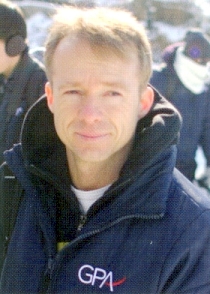
Roland
Platt
Roland Platt guides the 170 Unificationists, including twenty staff members, who make up the Generation Peace Academy (GPA) a program that seeks to give young first- and second-generation members the tools to secure a rich base of experience in life that will bring them closer to God and prepare them to achieve their dreams. We spoke to Mr. Platt during a recent visit to Korea with a group of GPA members.
Question: Do you have a long history of working with Special Task Force (STF) which has now been restructured as Generation Peace Academy?
I became involved with STF in 2001, initially as a team leader and a group leader. I then helped to pioneer Latin American STF (Yes, I spoke enough Spanish!) and upon returning to the States in 2006 I became the director of STF USA. Special Task Force was first developed in 1994 but has been totally transformed under In Jin nim's leadership.
Question: I understand that GPA is part of an integrated system of ministries.
I've been a part of the leadership team of our program for ten years, and we've had about a hundred brothers and sisters each year. They would have profound experiences on the program, but then once they'd graduated from it, there wasn't much they could actually apply or transfer into real life from what they had experienced. Unfortunately, many of them kind of "crashed" after they experienced STF. That was always the challenge.
Now, though, I think we have a healthy ministry for graduates of the program to go back to when they return to their communities. In Jin nim is pulling everything together in America -- CARP, the American Clergy Leadership Conference (ACLC) and UPF. Everything is integrated and working together. For example, it's a seamless, natural transition now, from Generation Peace Academy into CARP.
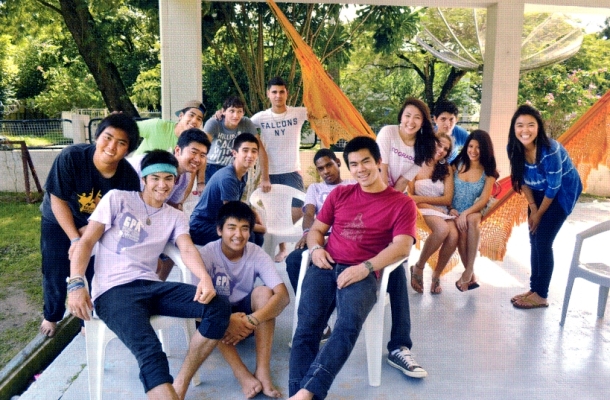
GPA
members participating in an international service module in Guyana
take a moment to send smiles around the world.
Question: This integrated approach must be of great benefit to the movement.
I am hopeful about it. In Jin nim's vision is to create a program not only for blessed children, but also for young first-generation Unificationists. Next year we'll begin accepting these young Unificationists to what is now a high quality program.
Question: Do you notice a difference between young members of the first generation and those of the second generation?
Second-generation members have an incredible spirit. I was a mobile fund-raising team (MFT) captain, and had the opportunity to guide many teams of first-generation members. We had members from Russia, the Philippines and Mongolia, but the very year we began with second-generation members, it was completely different. The bond they have between them is amazing. First-generation members are following their own course of restoration, and it's a little more individualistic, even competitive. The care and bonding among those in the second generation, on the other hand, is just amazing; it's beautiful to see.
Question: The people you work with are young, pre-university age?
Essentially, it's a post-high school program -- any age, post- high school. In the past few years, we've had an increasing number of people join who are twenty or twenty-one and have done a couple of years of college but decided to take a year off to refresh themselves.
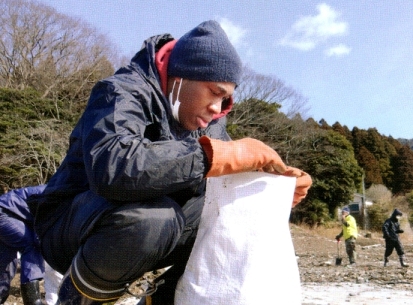
GPA
volunteers pick up debris left by the tsunami
Question: Can you explain the essence of what people do on GPA?
The year starts with a kick-off workshop, so everyone starts on the same page. We have three modules that participants take part in. We have what is called the Leadership Module, which is based at the Learning Center in Manhattan. They join the Leadership Initiative, which is a Lovin' Life program. Another module is the Fund-raising Module, where they experience being on a mobile fund-raising team, going through different levels of fund raising while traveling across the United States. The third module is the Overseas or International Service Module, which includes up to twenty- one days of overseas experience. Mostly, we've been working in South America, Central America and the Caribbean. This time, for the first time, we've come out to Asia, with this trip to Japan and Korea.
Question: "Service" means...
"Service" means finding a way to go to the roots of a local community. It's a great experience, especially for Americans second-generation members to see how privileged they are. They don't realize how fortunate they are until they develop relationships with people in other countries, many of them third-world countries, and actually stay there, working side-by-side with people from the local community. We do this for three weeks, and find out what it is like to not have running water, air conditioning, and other luxuries that we take for granted at home.
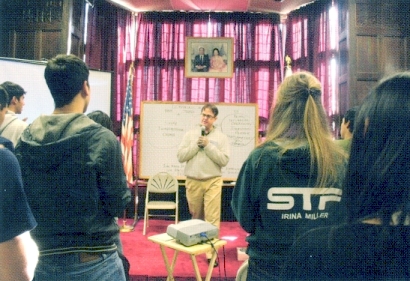
Brett
Moss speaks to GPA Leadership Module members
Question: How does the module system work?
Each module is about two and a half months, seventy-five days, and between each of the three modules, we have a big workshop where all of GPA comes together. For example, one group might come back from Manhattan where they'd spent a lot of time with In Jin nim's family and had wonderful experiences with ballroom dancing and the Lovin' Life Ministry. Meanwhile, another group had been in Honduras building a medical clinic, and the other group had been having a fund raising competition in the Rocky Mountains.
When they come together there's an incredible spirit and energy. They share their reports and their testimonies, and they learn and inherit from each other. They then all switch into new modules, ready to gain new experiences.
The three modules were In Jin aim's idea. It's actually brilliant. We used to do one solid year of fund raising, and it was not easy for the members to keep motivated and focused for the entire time. After a year of fund raising, members would spend a second year witnessing, which had similar difficulties. No its short increments of time -- two and a half months -- through which they keep focused with a consistent spirit all year. It's working very well.
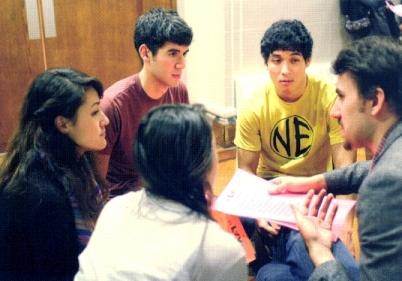
GPA
members discussing "love languages" at the Lovin' Life
youth group, Junction, as part of their Leadership Module
Question: GPA is a much more sophisticated approach than MFT was in my day.
Fund raising is good preparation for life. For years, In Jin nim has been observing the STF program. She saw that it focused on spiritual growth, which is important (the basic foundation of faith), but it didn't provide the confidence and skills to go on to college and into careers, to strive to be the best. She speaks a lot about internal and external excellence and she's trying to combine the two through GPA.
Question: It is fascinating to know that In Jin nim has put so much thought into these areas. So what qualities do you need to have as the director of GPA?
I've always seen it as the True Family's program. It was established by the True Family, and it's always been led by someone in the True Family. Whichever True Family member was leading the program, they put their own strength or spirit into it. In Jin nim has definitely taken the program to the next level.
I always feel I want to help create a program that makes In Jin nim proud and to raise the blessed children in a way she would raise her own children. I'm trying to make it an extension of her own education for her own children. That's what I'm always trying to think about.
Question: When you go out to the field with the GPA members, what do you try to convey to them?
More and more, I find myself thinking about the long term, how to prepare the members for life after GPA. I'm trying to teach them how to transfer and apply what they are learning now to their future. They are not just fund raising for the sake of fund raising„ but to develop character and valuable life skills. Their time on GPA is short, but how they live this one year can impact their entire lives. As In Jin nim says, it's not what we know that matters, it's how we live.
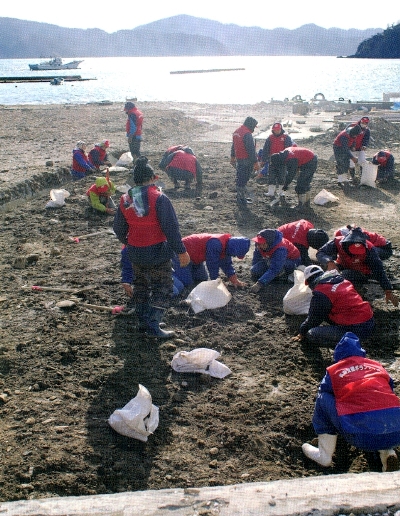
GPA
volunteers pick up debris left by the tsunami a year before.
Question: In between the modules, what do you teach them in the workshops?
Between the modules, we have five-day workshops that are focused on many topics such as the Divine Principle, True Parents life course, or blessing preparation. We often invite guest lecturers to help teach them. For example, during our workshop on True Parents' course, Jin-sung nim gave an incredible talk and helped us understand the True Family's course. Other guest speakers include Rev. Joshua Cotter and Mrs. Heather Thalheimer. We are giving the students a very well-rounded education.
Question: I imagine this has a profound effect on all who are present.
I think one of the most precious things that GPA members gain -- beside all the education we provide -- is this connection with the True Family. In the Leadership Module, we have the blessing of being close to In Jin nim's family. Her desire is that all blessed children come to love True Parents and feel that the True Family is my family.
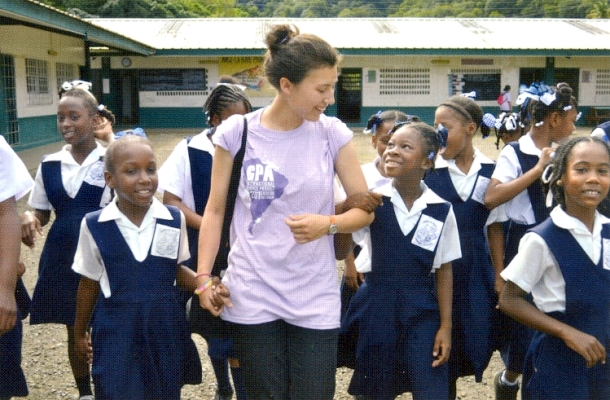
GPA
does regular service projects in the International Service Module;
pictured here is a GPA participant at a school on the island nation
of St. Lucia.
Question: Can you explain in more detail about how GPA is integrated with CARP and the church?
Lovin' Life Ministry uses five principles for spiritual growth: Inspire, Empower, Connect, Contribute and Inherit. These refer to basic habits of a healthy spiritual life. Throughout the year on GPA, we teach members how to practice these habits, so that once they graduate and go back to their communities, or even are alone at college, they can draw strength from these spiritual practices. It is a foundation for them to continue to grow spiritually after they graduate from the GPA course. That's why I now feel a lot more confident to have the blessed children graduate from this program and move on, because I know there's consistency within the program and after the program.
The whole Lovin' Life Ministries' image and package is very attractive for young people. In Jin nim was thinking for a long time about our name, Special Task Force. We're now called Generation Peace Academy. I think it's much more attractive. The name itself conveys what the essence of the program is.
Question: There's a program based in Seattle, Next Generation Academy, run by Jeff Adshead. Is there any relationship between GPA and NGA?
They are both great programs and each has their own strong points. We've done some things together, including some joint workshops. Having a variety of programs is good because there are all sorts of people in our second generation and not all of them are going to join GPA.
In Jin nim is trying to combine both the internal and the external aspects of excellence through GPA in order to give young people confidence to go out and get into good schools, get a good education, good careers, build a wonderful family and represent True Parents well.
Question: Perhaps members will do more when they graduate and become part of society.
Absolutely. In Jin nim shared that she's seen two extremes within the second generation -- one, of people who are very faithful. They join programs and attend workshops which usually do not place much emphasis on academic education. Maybe their parents didn't go to college, so they don't value it much. On the other hand, others are very much into academics. They might have a parent pushing them to become a doctor or lawyer, and they become successful but sometimes don't do anything for the church. In Jin nim is trying to bring out the best of both worlds by creating a program that integrates aspects of both internal and external excellence. In Jin nim stresses the development of the whole person and GPA reflects that.